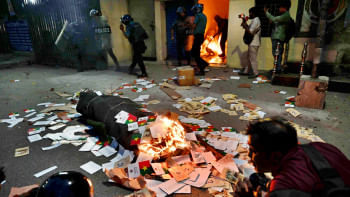Jihadists wage high-tech war to win Western recruits
Jihadist groups tied to the men who attacked France's Charlie Hebdo magazine and a Paris kosher supermarket are waging an increasingly sophisticated propaganda campaign targeting Western recruits, experts say.
Organisations ranging from the Islamic State (ISIS) group in Iraq and Syria to al-Qaeda and even the Somali Al-Shebab group have sought to exploit the anonymity and reach of the Internet to attract Western members.
They urge recruits to come to the battlefield, but also encourage them to carry out violence at home.
Jihadist groups have targeted Western recruits for decades, but the Internet has revolutionised their approach, according to Clint Watts, a senior fellow at the Foreign Policy Research Institute.
"Thirty years ago it took a long time to get everyone to Afghanistan" where jihadists were fighting Soviet troops, he said.
"Now they propagate through social media, that's why it can happen so quickly, they can rapidly ramp up recruitment."
The three men involved in the France attack appear to be linked to different jihadist groups.
The two brothers who targeted Charlie Hebdo were linked to al-Qaeda in the Arabian Peninsula (AQAP), which is based in Yemen.
The third attacker appears to have pledged allegiance to ISIS. Jihadists use a variety of media for their message.
Since 2010, AQAP has produced the English-language "Inspire" magazine, released periodically in PDF format with articles expounding on its ideology and instructing readers on how to carry out attacks.
In recent issues it singled out France as a target and put Charlie Hebdo's editor-in-chief Stephane Charbonnier, who was killed in last week's attack, on a "Most Wanted" list.
Al-Nusra Front, al-Qaeda's Syrian affiliate, publishes slickly produced video, as well as photos and statements, through official accounts on Twitter and the video-sharing website YouTube.
And Somalia's Al-Shebab has frequently used Twitter to reach out to potential followers.
But perhaps no group has harnessed the power of the Internet as effectively as ISIS, which eschewed the password-protected forums preferred by al-Qaeda in favour of popular social media sites.
It quickly established a presence on Facebook and Twitter and even allows its fighters to converse publicly with potential recruits on question-and-answer sites like Ask.fm.
"Islamic State has really honed its media strategy," said Charlie Winter, a researcher at the Quilliam Foundation, a counter-extremist think tank.
"It has a standardised format, which makes it easy to identify as official Islamic State propaganda. It is very productive, it has an output rate of four or five videos a week," he said.
The group also relies on "a wide, decentralised network of people who are almost obsessive in their need to share things" to distribute its material, Winter added.
ISIS and its backers also use high-profile methods, like this week's hacking of the Pentagon's Central Command Twitter feed, to gain notice.

 For all latest news, follow The Daily Star's Google News channel.
For all latest news, follow The Daily Star's Google News channel. 



Comments